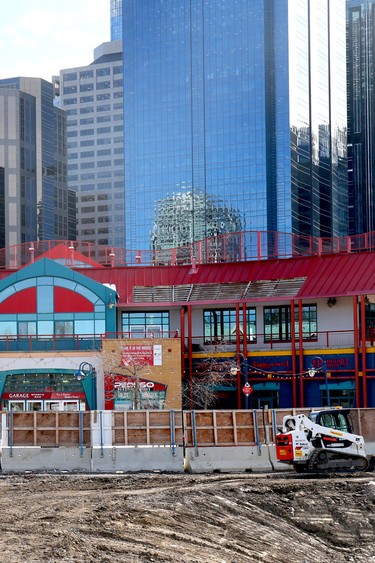 budget in Calgary on Tuesday, March 12, 2024. Darren Makowichuk/Postmedia" width="" height="" />
budget in Calgary on Tuesday, March 12, 2024. Darren Makowichuk/Postmedia" width="" height="" />You can save this article by registering for free here. Or sign-in if you have an account.
 budget in Calgary on Tuesday, March 12, 2024. Darren Makowichuk/Postmedia" width="" height="" />
budget in Calgary on Tuesday, March 12, 2024. Darren Makowichuk/Postmedia" width="" height="" />
In the beginning were high hopes, that creating a shopping and dining hub on a prime slice of real estate would spark a revolution in a downtown Calgary moribund after the office towers emptied.
There was even fear among sex trade workers plying the nearby 3 Ave. stroll that crowds descending on the new Eau Claire Market would scare off business.
But over three decades, while the dream of creating and revitalizing a focal point inspired by Vancouver’s Granville Island Market showed glimmers of promise, it ultimately died a lingering death told in a tale of elusive remakes and commercial disconnects.
Advertisement 2 Story continues below This advertisement has not loaded yet, but your article continues below. THIS CONTENT IS RESERVED FOR SUBSCRIBERS ONLYSubscribe now to read the latest news in your city and across Canada.
Subscribe now to read the latest news in your city and across Canada.
Create an account or sign in to continue with your reading experience.
If you are a Home delivery print subscriber, unlimited online access is included in your subscription. Activate your Online Access Now
Article content“The misnomer was that it was going to look like Granville Market, which was the development of an entire area, along with studios and art enclaves which is much larger,” said Richard White, an urban development consultant who headed the Calgary Downtown Association in the summer of 1993 when Eau Claire Market first opened its doors.
Article content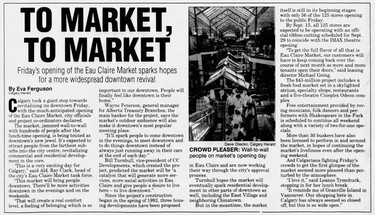
“(Eau Claire) was successful for the first two or three years but you’ve got to look at 10 years, you’ve got to create some kind of sustainable interest.”
Michael Going wouldn’t disagree. The CEO of Good Earth Coffee House was the market’s first and longest-running tenant who also helped develop the concept over four years and enlisted other vendors.
“For the first couple of years it was quite busy, it started off on the right foot,” said Going, adding his Good Earth location there was “extremely successful for five to 10 years.”
But he said the site’s owner, the City of Calgary, placed unrealistic stipulations on it, including requiring produce vendors to offer their wares seven days a week rather than the more manageable three or four.
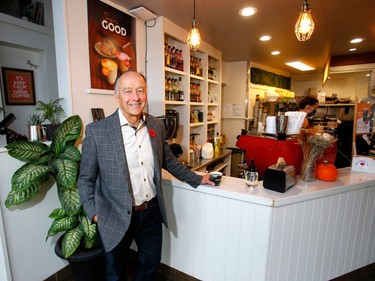
“Things are really slow Mondays and Tuesdays and it’s difficult for a tenant to pay rent 365 days a year,” said Going.
Even so, its earlier, happier days blazed a path for what would become flourishing farmers’ markets in Calgary, he said.
And Granville Island was initially owned by the federal government which offered financial supports in its infancy, something never afforded Eau Claire, added Going.
Advertisement 3 Story continues below This advertisement has not loaded yet, but your article continues below. Article content“(Eau Claire) didn’t have that incubation period to get it started,” he said.
For it to have been the magnet its proponents had expected, the downtown mall, at less than 200,000 sq. ft. would have needed at least 500,000 sq. ft. of space with a different personality, said White. Paid parking was another Achilles heel, said Going.
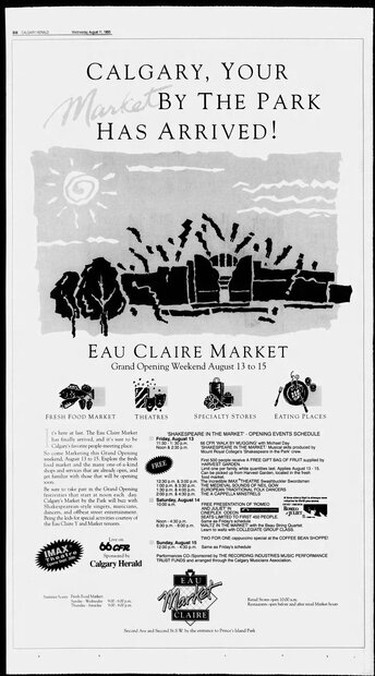
That search for a winning formula tangibly comes to an end May 31 when owner Harvard Developments Inc. hands the site over to the city, which will oversee its demolition beginning in July and ending in the fall.
Where a mall-style retail formula stumbled before, it’s hoped the bustle from a future downtown Green Line LRT station will galvanize the location.
The closure marks the end of an era for Eau Claire Market, which has served as an eclectic hub for shopping, entertainment, and community events since its arrival in 1993,” Harvard said in a March 4, 2024 press release.
The addition of the future Green Line Station is expected to be a catalyst for the site; supporting Harvard Developments’ plan to transform it into a mixed-use, transit-oriented area that aligns with the growth strategy of downtown Calgary.
Stand-alone remnants of the adjacent market and reminders of its 31-year run will be site mainstay restaurant Joey Eau Claire, which will remain along with Local Public Eatery.
The recent demolition of the building that once housed the Hard Rock Cafe was a precursor to the final act.
“The Hard Rock Cafe wasn’t the right fit – Eau Claire Market wanted to be more of an independent operator and Hard Rock didn’t check any of the boxes,” said Going.
Advertisement 4 Story continues below This advertisement has not loaded yet, but your article continues below. Article content Article content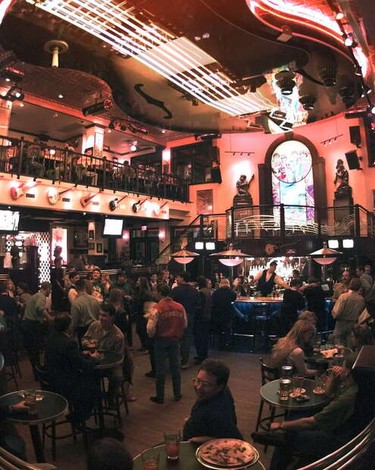
That rock n’ roll eatery shuttered in 2000 following a five-year run. All that’s left of it is memorabilia widely scattered, including a Beatles stained glass window that ended up in a recording studio just east of the city.
It’s a similar fate that befell what was left of John Yee’s Sumo Lounge, which once occupied a spot in the market’s northwest side.
“I’ve auctioned off everything from the restaurant at 10 cents on the dollar,” said Yee, a fixture on the Calgary restaurant scene for decades and whose last stop on it was Eau Claire Market.
Yee said he’ll now try his luck as a restaurateur in Nanaimo, B.C.
He’s one of 50 tenants that have been vacating the cavernous, increasingly quiet space over the past few months in anticipation of its closure.
Yee was a relative late-comer to the mall, taking over the Sumo Lounge space a decade ago with a sweet leasing deal and expectations the market would undergo a make-over.
“I was really excited about that, I thought there was going to be this huge amount of investment, there were a lot of artist’s renderings of an attractive and vibrant place,” said Yee.
“But it never materialized.”
Article content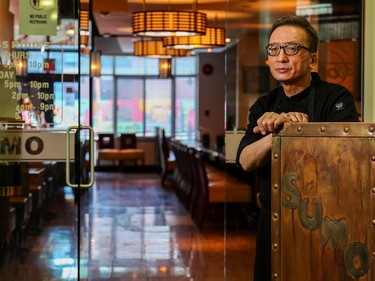
Yee said he watched the coming of Eau Claire Market with considerable interest and when he closed his Cochrane restaurant in the 1990s, he was encouraged by the success of its Joey Tomato and other area eateries.
Instead, Yee said his business was on a downward trajectory as soon as it opened.
“I lost big time…I really regret going there – if I’d gone somewhere else I’d still be in business today,” he said.